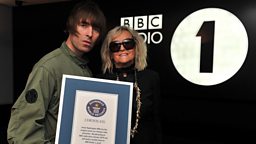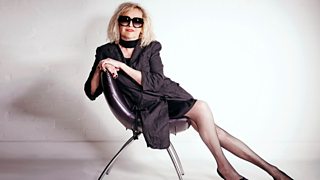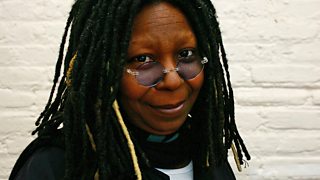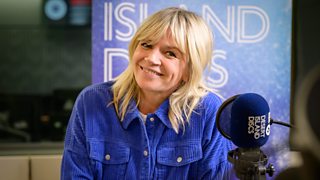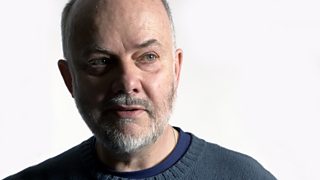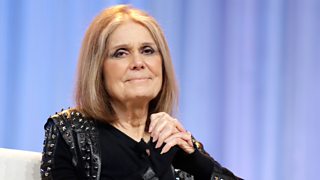10 things we learned from Annie Nightingale’s Desert Island Discs
Annie Nightingale has remained at the sharp end of popular culture for over half a century, searching for new music, spearheading new movements and supporting emerging artists and sounds from David Bowie and Ian Dury to acid house, breakbeat and beyond. She was the first woman to have her own show on Radio 1, joining the station in 1970.
So what did we find out from Annie Nightingale’s Desert Island Discs?
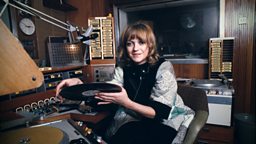
Listen to Annie Nightingale's Desert Island Discs
1. She still gets excited discovering new music
“I have to quote John Peel,” says Annie, referring to the hugely influential DJ, “because he put it best, which is you want to hear something you’ve never heard before. I couldn’t put it better than that…. And the more music we have it actually becomes more difficult. You get people who say it’s all been done before, or that was a copy of something else. People get very jaded, they lose that excitement of finding the freshness in new music. Somehow it seems to be something I’ve been able to hang on to.”
You want to hear something you’ve never heard before
2. She discovered her first choice of disc thanks to a teenager – and it’s by a teenager
“I think young people know music, they cut through all the publicity and promotion stuff. My first disc was introduced to me by a 13-year-old girl.” The track is Billie Eilish’s Bury a Friend, released last year when Billie was 17. “I think she and her brother Finneas have a once in a lifetime talent,” says Annie.
3. Her desire for a fulfilling career began at home
Annie reveals that her parents were unhappy - her father had inherited his father’s wallpaper business “but it wasn’t something that he enjoyed… and he should never have been made to do it”, and Annie’s mother had turned down the opportunity to go and work in America which Annie believes she always regretted. “I think that’s influenced my life of wanting to encourage women to feel confident and to carry on working and have that fulfilment.”
4. Her parents weren’t Catholics but she went to a Convent school
“I went crazy with it,” says Annie. “There were statues everywhere of Jesus and pictures of Jesus. We didn’t have pop stars then, so Jesus was the pop star, the Virgin Mary was a pop star. We collected pictures of them. We collected rosaries, we would have them blessed by the local priest. I think my parents were a bit alarmed. I was on my way to becoming a nun by the time I was seven, eight, nine.”
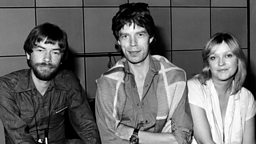
5. Radio Luxembourg was revolutionary (and not just for Annie)
When Annie was growing up, she says there was only “���˿��� Radio... and then we discovered Radio Luxembourg [a commercial station which broadcast from Luxembourg to the UK as a way of circumventing the ���˿���’s broadcasting monopoly] and that changed everything for us - R‘n’B, Fats Domino, Little Richard, and I was listening to that on my own and so were a whole generation all over the UK including four guys in Liverpool. That music was not being played on the ���˿���. It was our secret world and it was incredibly exciting.”
6. Annie got to know The Beatles – so which of their songs does she choose?
“Well obviously most people say: ‘Oh, you’re doing Desert Island Discs, which Beatles track are you going to have? And it’s impossible,” says Annie. “So I’ve gone for a John Lennon track he made after The Beatles. I feel I almost want to apologise, as if it matters, but The Beatles changed my life and I’m in debt to them and so I’ll say ‘Sorry Paul, Ringo and George’ for choosing a John song.” And the song is Instant Karma! (We All Shine On).
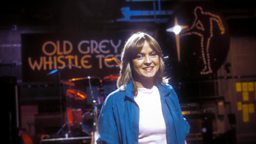
7. Her first job in the media was on a local paper
In the early 1960s, Annie was the only woman working on the Evening Argus in Brighton, reviewing records in a column titled ‘Spin with Me’. “I was a general reporter as well and it was the most wonderful training. You didn’t think that at the time, but things like covering council parish meetings or court reporting, I was learning so much. To make something out of one paragraph is much more difficult. The big stories write themselves,” says Annie.
They said ‘Our disc jockeys are husband substitutes’ which I thought was an extraordinary thing to say
8. An interview with Dusty Springfield led to her next big break
Annie’s work as a journalist gave her the chance to interview many of the stars of the 1960s. .”That’s how I met The Beatles,” says Annie. “I went to interview Dusty Springfield in Brighton where I lived. I went backstage after the show and Dusty said; ‘Oh, this is Vicki Wickham.” And I said: ‘You’re the very person I want to meet,’ because I knew that she was the editor of Ready Steady Go! - the first really brilliant pop TV show. It brought Motown, it brought black music to us which we’d never heard before.… I was part managing a band and I said to Vicki: ‘I’d love to get our band on Ready Steady Go!’ and she said ‘Bring the record to me in London,’ so I did and she went: ‘OK, we’ll think about that but we’re looking for a presenter for a new show, a sister show for Ready Steady Go! - would you be interested?’ So suddenly I was involved in that world.”
9. When she first tried to get a job on Radio 1 she was turned down
“They said ‘No, absolutely not!’ and I went ‘Why?’ because I hadn’t actually really experienced sexism until then. I’d never experienced this wall of ‘No, you can’t’. And so I said ‘Why?’ and they came out with this wonderful line: ‘Our disc jockeys are husband substitutes’ which I thought was an extraordinary thing to say. That set up an awful lot of assumptions that all the women pop fans were housewives at home doing the ironing and they would say to me: ‘Why would a woman want to be a DJ?’ They were bewildered.” She finally got her Radio 1 job when a new controller took over and she was recommended by The Beatles’ publicist. She was the only female DJ for 12 years until Janice Long arrived in 1982.
10. She’s the longest serving DJ on Radio 1. What’s her secret?
“I don’t know,’ admits Annie. “I’m deeply grateful for the continuing opportunities to keep on doing what I love doing. Young music is for young people, and as they grow up other things come into their lives, but for me it carried on: what’s going to come next? And I feel that if I can help anybody get a foothold on the ladder of recognition - because there is so much music now, you can make music at home in your bedroom and you can put it on all these different digital platforms but who is going to take notice of it? So I know what it means to get your tune played on national radio. I said to Vicki Wickham of Ready Steady Go!: ‘I owe you so much,’ and she said: ‘Pass it on,’ and if I’ve been able to do that then great.”
